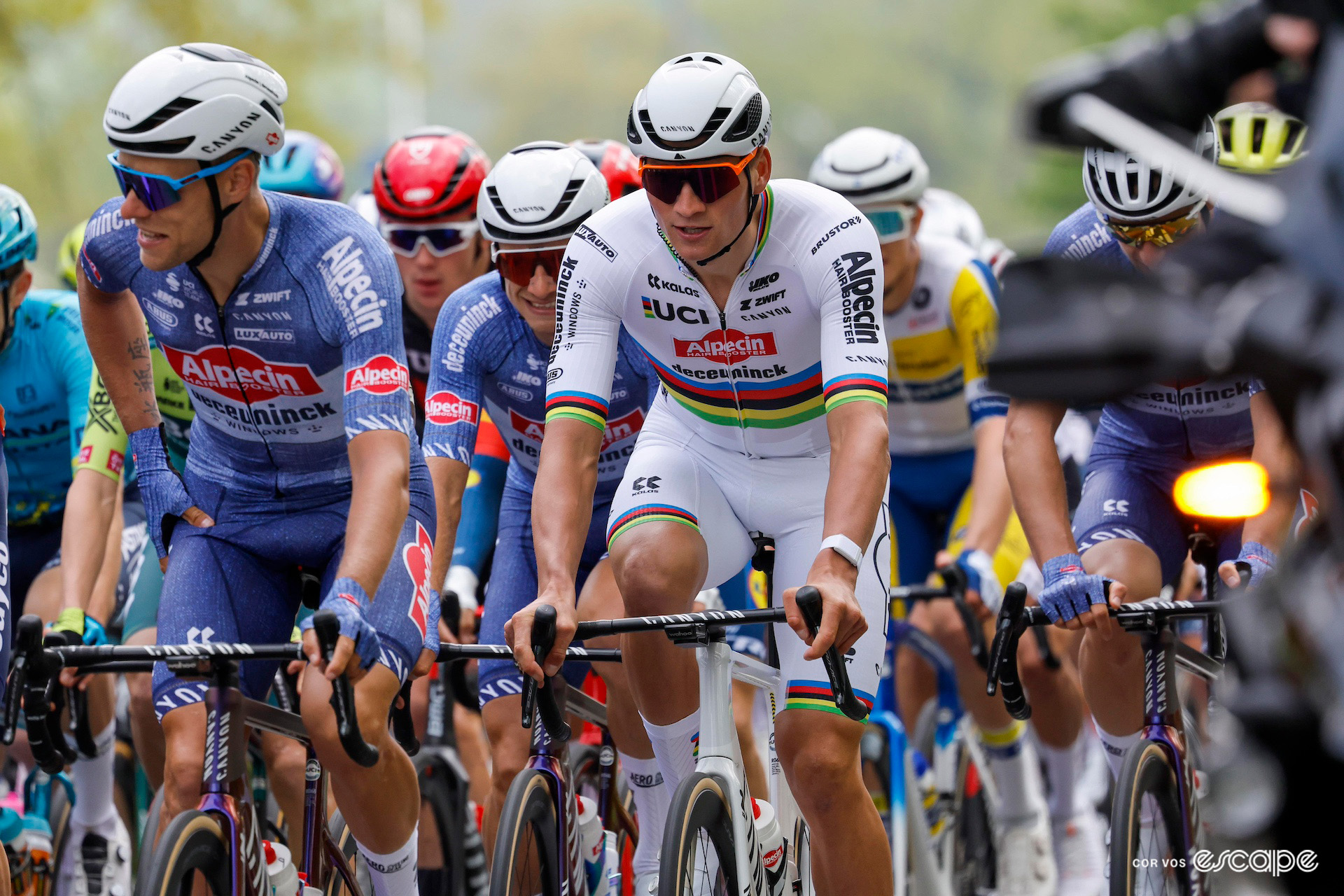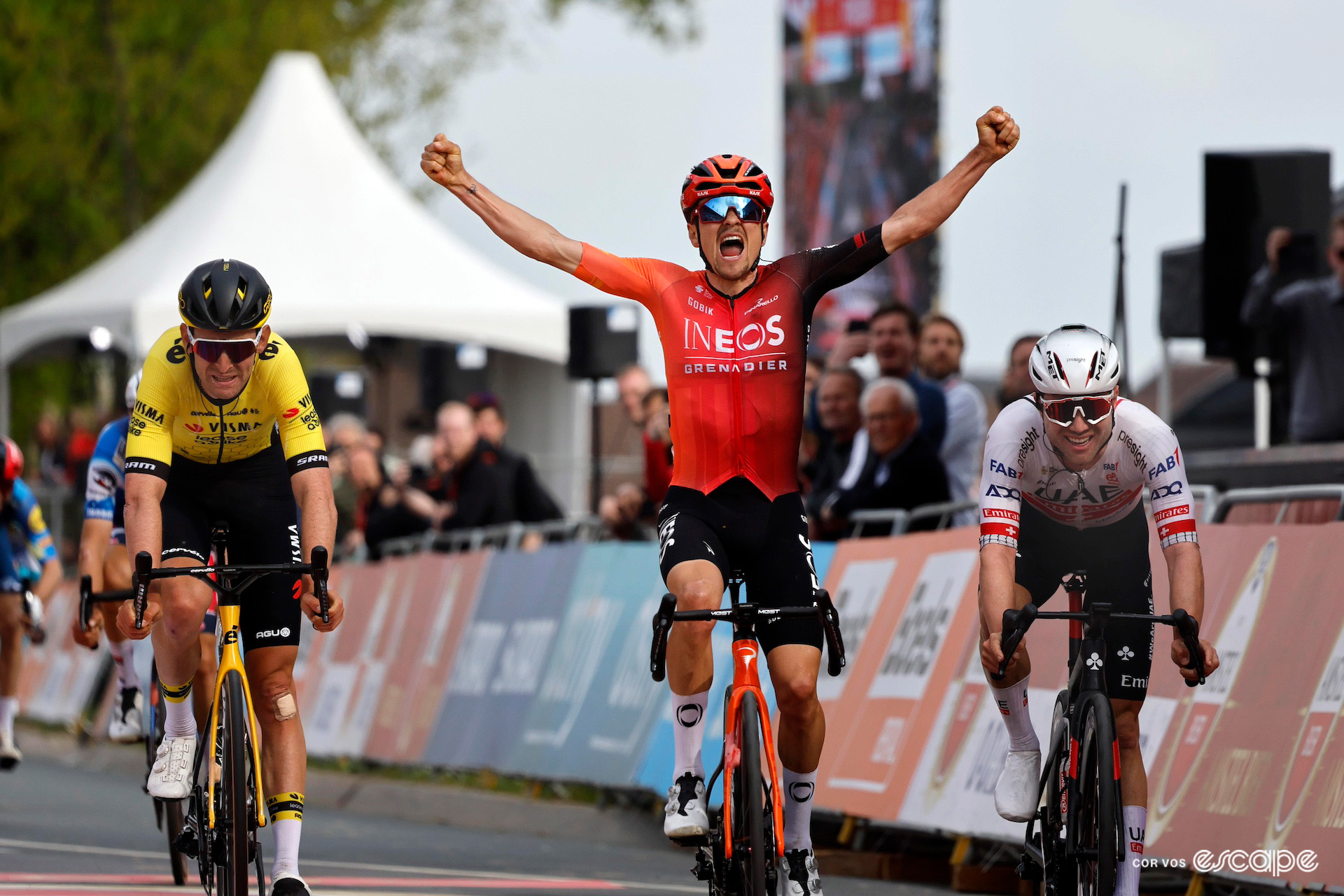A sense of foreboding has been cast over the men’s peloton in recent weeks, a looming shadow in the shape of Mathieu van der Poel, who turned up to the Amstel Gold Race dressed head to toe in white. Naturally, Alpecin-Deceuninck threw their weight around in the peloton, but their rivals refused to race for second.
A dramatic final hour saw a 12-man group force a wedge between them and the reduced peloton. Four of them then broke clear just outside 13 km to go, and the quartet were just about able to keep the chasing group and looming peloton at bay. Mauri Vansevenant led them out, and Tom Pidcock was able to out-sprint his companions in the frantic dash to the line.
- There was an amendment to the route early on after an incident on the course – which forced a neutralisation and shortening of the women’s race – meaning the men would skip the Bergseweg (50 km into the race) and head to the Korenweg by a different route.
- It was on the first ascent of the Cauberg where the first blows were landed on Alpecin-Deceuninck’s dominance and Mathieu van der Poel’s favourite status, a flurry of accelerations grinding down the four-man break’s lead until the catch was made with 74 km to go. Bob Jungels (Bora-Hansgrohe) provoked an early skirmish, as did Louis Vervaeke, and it was the Soudal-QuickStep rider who would jump clear of the peloton just inside the last 60 km, taking two strong riders with him in Mikkel Honoré (EF Education-EasyPost) and Paul Lapeira (Decathlon-AG2R La Mondiale).
- What ultimately proved a decisive shift in the race situation came on the tricky Eyserbosweg climb (0.9km at 9.3%) 36 km from the finish, where Vervaeke was dropped by his companions and quickly gobbled up by the shrinking bunch, which proceeded to shred itself in the ensuing kilometres.
- The race was in pieces for several fast kilometres, with Marc Hirschi particularly active. The Swiss national champion was instrumental in creating the winning move as a 12-rider lead group formed ahead of a peloton left floundering – some teams were content to let them go given their representation up ahead, and others simply didn’t have the numbers to smash it with almost an hour of challenging terrain ahead of them, Alpecin-Deceuninck included.
- With their advantage intact, the leaders began to attack one another in the last 20 km, hitting the Cauberg almost 45 seconds before the bunch, which took their chance to have another go on the iconic climb, Mattias Skjelmose and Michael Matthews both enthusiastic but ultimately unsuccessful.
- With just over 13 km to go and half-a-minute’s advantage, Hirschi went on the attack again, shortly after Pello Bilbao’s own attempt had been foiled. This time, the UAE Team Emirates rider was successful in jettisoning most of his rivals, with Tiesj Benoot, Mauri Vansevenant and Tom Pidcock the only ones to tag along.
- Vansevenant was put in a little trouble when Pidcock accelerated 5.7 km out – Paul Lapeira had attempted to bridge from the chase and Pidcock was not interested in more company – but the quartet came to the finish together.
- It was touch and go in the finishing straight, but thanks to Vansevenant’s lead-out, the leaders stayed clear and Pidcock had the punch to out-sprint his rivals. The second group on the road finished on the same time as the winner, with Michael Matthews leading the bunch home just 11 seconds later.
Brief results:
Loading...
Quote of the day
“I was going to say it’s great to win for the second time, but that might create quite some controversy!”
Tom Pidcock in his post-race winner’s interview, referring to the 2021 photo-finish controversy that saw him land runner-up to Wout van Aert.

Brief analysis
- Pidcock had two-time Amstel Gold Race winner Michał Kwiatkowski in his armoury for the race he should probably already have on his palmarès, and the Pole was deployed early, 44 km out. With the Vervaeke-Honoré-Lapeira trio out front, the peloton was already somewhat diminished and Ineos Grenadiers was one of the teams running low on matches to burn – the answer: make it hard for everyone so Pidcock needs only to fight with individuals rather than whole teams. It wasn’t the decisive blow, but Kwiatkowski’s status and supporting role to one of the favourites drew out all the big names including Van der Poel, Matteo Jorgenson, Mattias Skjelmose, Ben Healy, etc., forcing them into action that barely relented for the remainder of the race race.
- For Soudal-QuickStep, Vansevenant’s fourth-place finish was bettered only by Tim Merlier in the sprint-friendly 1.Pro races this Classics season, and in the absence of a spring-saving effort from Remco Evenepoel, as in recent seasons, he and Louis Vervaeke – and Ilan van Wilder come Flèche-Wallonne – are the last hopes for Soudal-QuickStep at the end of another disastrous spring. That’s perhaps why the young Belgian opted to lead from the front down the finishing straight at the WorldTour Amstel Gold Race, as settling for fourth is far better than ninth, or dropping out of the top 10 all together. When interviewed post-race, Vansevenant told Sporza, “We have shown that we are there as a team, that we are the Wolfpack – on to the next Classics. We want to show the will to race and find the right flow again. There are mixed feelings now. Still, it was a great match and I felt good. The podium was there, but then again it wasn’t.”
Social highlight
Pidcock and Amstel Bier is a … winning combination.
Did we do a good job with this story?


